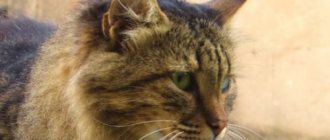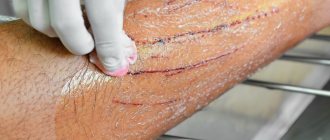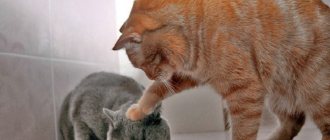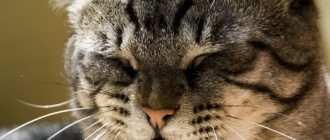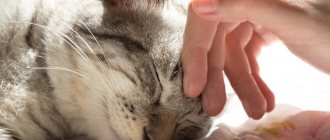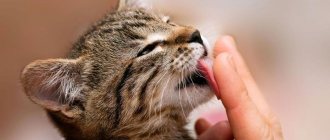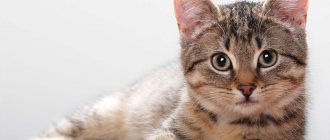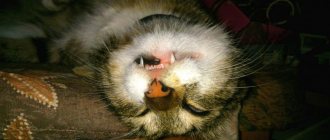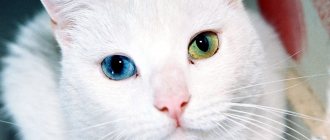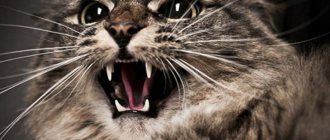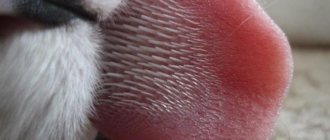The condition of the dentogingival system is an indicator of order in the cat’s internal organs. If you have problems with your teeth, this is a signal of a disease not only of the digestive system, but also of problems in other systems.
One of the common problems in cats is grinding - the unpleasant sound of tooth enamel rubbing against each other.
It happens that a pet grinds its teeth only while eating, but it happens that the process continues constantly or occurs regardless of food intake.
How it manifests itself
The symptom manifests itself in a cat as teeth rubbing with the characteristic sounds of grinding or squeaking.
This phenomenon often occurs:
- when eating food;
- after meal;
- during sleep.
Sometimes a cat grinds its teeth as if eating. She makes chewing movements, but there is no food in her mouth.
Teeth grinding is often associated with various diseases, and therefore may be accompanied by other symptoms depending on the pathology. Additional signs include vomiting and nausea, weakness, sleep disturbance, and loss of appetite.
In any case, this symptom cannot be ignored, because it may indicate a serious illness in the animal.
The cat grinds its teeth and seems to be chewing something
Let's look at the causes of teeth grinding that do not depend on food intake.
Liver failure
For some reason (for example, parasites), the liver cannot cope with its function.
The products of bile metabolism enter the blood and settle in the tissues. Bile acids and their salts are quite aggressive substances that lead to bitterness in the mouth and itchy gums .
The cat's teeth itch due to liver failure.
Therefore, the animal tries to “comb” its gums - you can hear the grinding of teeth.
Chronic renal failure in late stages
Blood purification products do not leave the body.
Urea salts (urates) and unremoved nitrates circulate through the blood, and the body tries to remove their excess through the skin and mucous membranes. Your pet's fur and mouth begin to smell like urine.
Urates, accumulating on the surface of the enamel, make it dull and rough. Therefore, when rubbing with teeth and chewing, a characteristic sound is heard.
Uremic gastritis
Another consequence of renal failure is uremic gastritis.
Nitro compounds and urates damage the gastric mucosa, contributing to the formation of numerous erosions on it.
Often with this pathology, reflux occurs - the backflow of stomach contents into the esophagus, which can reach the oral cavity. Stomach acid in combination with urea salts has a detrimental effect on enamel, contributing to its destruction.
Causes of pathology when eating food
If a cat grinds while eating, the causes may be various diseases of the gums and teeth:
- Tartar. It is characterized by dense growths of a yellow-brown hue on the periodontal groove.
- Periodontal disease. This is an inflammatory process accompanied by degeneration of gum tissue. As a result, when the animal eats food, its teeth become loose. Their friction sounds like a squeak. This symptom occurs in the last stage of the disease.
- Gingivitis. With this disease, the gums become inflamed. Signs of the pathological condition are redness and swelling of the gums, and the appearance of pustules in the oral cavity.
- Other dental pathologies. Various dental defects and their improper development can also lead to a cat starting to chatter its teeth.
The sign also indicates a subluxation or dislocation of the pet's jaw . A cat can get injured after an unfortunate fall. In older animals, a common cause of jaw subluxation is a strong yawn.
If your kitten grinds his teeth, the cause may be tooth loss. Usually this phenomenon is observed between the ages of 4 months and six months.
The symptom develops in certain kidney and liver diseases. When these organs malfunction, uric acid salts and bile enter the oral cavity through the bloodstream.
These substances begin to irritate the mucous membranes, cause itching of the gums, and the tooth surface is destroyed. The animal begins to clang its teeth.
Rabies in a cat can also manifest itself as squeaking. This is explained by the fact that when chewing, the pet experiences severe pain.
The animal becomes aggressive, develops a fear of water and light, and foams at the mouth.
A common cause of teeth grinding when a cat eats is food that is too hard or soft.
Diseases
Veterinarians always pay serious attention to the manifestation of these symptoms in the behavior of cats. Therefore, if the owner notices that the cat’s lower jaw periodically twitches or he clicks his tongue, grinds his teeth and does not eat, he must tell a specialist about this. What could this indicate?
There are a number of serious diseases that can also be manifested by the presence of sounds such as grinding and clicking:
- In case of renal failure, urate accumulates on the enamel of teeth . Because of them, the enamel becomes rough, which is why when teeth rub, a characteristic sound is produced. Kidney failure will also be indicated by a specific smell from urine from the cat's mouth.
- Perhaps the pet has developed uremic gastritis due to the same kidney failure . And the enamel is destroyed due to the effects of stomach acid and urea salts.
- A dangerous situation if the grinding also became a manifestation of liver failure. In this case, the products of bile metabolism pathologically enter the cat’s mouth, causing itching of the gums and a feeling of bitterness. This is unpleasant; the cat will try to rub its gums in some way.
Cutting teeth can be a signal that your cat is rabid. With such a serious and dangerous disease, the animal also has problems with the movement of the lower jaw. Trying to make such a movement, the cat grinds its teeth and clicks its jaw. If you also notice aggression from a pet that was usually calm, you should immediately try to isolate it.
Indoors, the cat should remain under supervision for some time. You should also call a veterinarian who will take a cerebrospinal fluid test. This disease is fatal and dangerous for people, so it is better to exercise excessive caution than to end up in a dangerous situation later. Unfortunately, the disease cannot be treated; the animal will need to be euthanized.
At such a moment, it is important to think about the safety of the cat owner and his family. Caution must not be neglected.
ATTENTION! Doctors recommend injections to family members, which should protect against rabies. The injections are carried out over a long period of time; you need to receive seven injections over six months.
When an animal is undergoing surgery, after anesthesia it may also grind its teeth, since in any case it feels pain at first. In addition, the body has suffered severe intoxication due to anesthesia, which can cause grinding.
Cat squeaks after eating
After eating, the animal may grind its teeth due to severe helminthic infestations.
The post-prandial sign occurs when the animal suffers from uremic gastritis, kidney disease and liver failure.
The development of teeth grinding in a cat can be a symptom of rabies.
After eating food, the cat makes a grinding noise after medical procedures. This condition develops with neurological disorders.
Other causes of teeth grinding
Replacing baby teeth doesn't always go smoothly. In cases where the owner notices that the kitten’s teeth have begun to grind, it is necessary to look into its mouth. Permanent teeth can grow next to baby teeth. Loose baby teeth cause teeth to grind. A month after the teeth change begins, the grinding disappears. An exception is preserving the baby tooth(s) when the kitten is six months old. This tooth is removed in a veterinary clinic.
The cause of teeth grinding can be neurological disorders after anesthesia . Exceeding the dose of anesthetic, a delay in removing it from the body, features of the nervous system - all this can affect the cat’s condition. In such cases, the cat’s teeth grind, regardless of time and food intake.
Causes of pathology during sleep
An animal may also grind its teeth in a dream. Usually this condition is a consequence of a stressful situation experienced. After nervous shock, a cat's jaw may clench when it sleeps.
This phenomenon in veterinary medicine is called stress bruxism.
Another reason is the pet’s recovery from anesthesia after surgery.
A cat grinds its teeth in its sleep due to helminthic infestation. If parasites in the animal’s body are activated, then these signs become more intense.
Stress
It is known that cats are impressionable, emotional creatures; they often experience stressful conditions. And one of the manifestations of this condition may be teeth grinding. A cat cannot, like a human, clench its fists when it is very tense and worried. And an animal may not experience its emotions immediately, but after a stressful situation, with a somewhat delayed reaction.
If teeth grinding is heard at night while your pet is sleeping, we can say that this is stress bruxism. During the day, the cat could become very nervous (for various reasons), and at night its condition was manifested by these sounds. New, artificially bred breeds are especially impressionable.
With psychological bruxism, it is not necessary to rush to the veterinarian; you just need to surround the animal with attention and show a little more care for it. But recommendations from a specialist can also be useful, for example, a doctor can prescribe a suitable sedative, which will not be superfluous.
Grinding of teeth, nausea or vomiting in a cat
Sometimes the grinding is accompanied by other unpleasant symptoms. If a cat is sick or vomiting, then these symptoms may indicate the presence of parasites in the pet’s body, diarrhea or constipation develops, appetite worsens, and body weight decreases.
A cat burps and grinds its teeth if it suffers from uremic gastritis or liver diseases.
The animal eats poorly and often makes chewing movements.
Additional symptoms include:
- general weakness;
- urinary disturbance;
- bad breath.
The animal vomits when kidney problems develop. Such pathologies are accompanied by frequent urination, nausea, lethargy and apathy.
What to do
The least dangerous situation is if the grinding and clicking of the tongue is associated with the appearance of tartar. In this case, professional cleaning is carried out to eliminate the cause of unpleasant symptoms and sounds. You can also improve the condition of teeth with periodontal disease.
In order to sanitize the oral cavity, clean it of bacteria and harmful microorganisms, you need to wipe the cat’s mouth with a solution of chlorhexidine and furatsilin once every six months. Metrogyl gel is also used for such purposes.
But if the sounds are caused by diseases, you need to immediately begin examination, diagnosis, and treatment. A biochemical blood test is required to show the presence of renal or liver failure or other diseases. You should not delay the process, as every day the pet’s condition worsens and the disease becomes more advanced.
How to accurately determine the cause
To reliably determine why a cat’s teeth grind, the animal must be shown to a veterinarian.
Diagnosis begins with a visual examination by a specialist and collection of anamnesis.
Pathologies of the gums and teeth can be determined using x-ray or ultrasound.
To establish an accurate diagnosis, a blood test for biochemistry and a urine test are performed.
It is important to make an accurate diagnosis; the correct treatment and elimination of symptoms depend on this.
Prevention
The general condition of the pet largely depends on the health of the teeth and oral cavity. Teeth do not have to hurt so that the cat cannot eat or chew food normally, without pain . Tartar, enamel damage, and periodontal disease cause discomfort and unpleasant sensations. If there is inflammation of the gums in the mouth, the pet will not be able to eat normally, it will lose weight, and its general condition will worsen.
In animals, all body systems are also closely connected, just like in humans. And teeth take an active part in food consumption, on which health and activity depend. Development of the cat's body. Therefore, every normal owner, having taken responsibility for the cat, must also monitor the condition of his mouth and teeth.
IMPORTANT! If there are deviations, modern methods of veterinary dentistry can cope with any.
Grinding can be caused by such pathologies in the development of the dental-jaw system as uneven growth of the incisors, an incomplete set of teeth, or a superset. The cat may develop an abnormal bite or improper jaw position, which also interferes with normal chewing of food and causes characteristic sounds.
Even too large fangs are not the norm for a cat’s body. Such pathologies of the development of the jaw and teeth are not just of an aesthetic nature and cause some inconvenience. In this case, the cat may experience pain, not only when eating. Only a doctor can help a poor animal, and taking it to a specialist is the owner’s responsibility.
The owner can do the first inspection himself to see the presence of pathology; it is convenient to use a small flashlight for inspection.
One of the problems with dental health is the cat's consumption of only dry ready-made food. The food can be prepared, but you need to alternate dry food with soft food so that the teeth develop normally and are in good condition.
How to help your pet
To help your cat, you must first determine why this symptom develops. Medications in the form of tablets, drops, injections, and surgical methods can be used. In some cases, the animal is prescribed a special diet.
What to do in case of teeth grinding depends on the cause of the development of this condition:
- If your cat has a subluxated or dislocated jaw, it needs to be realigned.
- In case of nervous shock and stress, the animal is prescribed sedatives.
- To treat periodontal disease and stone, medications are used for hygienic cleaning of the oral cavity (Chlorhexidine, Miramistin, Furacilin, Metrogyl and hydrogen peroxide). In advanced forms of the disease, it is possible to remove teeth under general anesthesia.
- When a cat has parasites, anthelmintic drugs are prescribed. Products are used for internal or external use.
- If a grinding sound occurs due to food, it is necessary to adjust the animal’s nutrition. It is advisable to alternate soft and hard food.
- To facilitate the change of teeth in kittens, you can massage the gums.
If a cat has liver or kidney disease, experts recommend giving your pet food low in protein and plenty of fluids.
If teeth grinding is caused by rabies, the animal will die. He urgently needs to be isolated . The pet owner is prescribed a course of vaccination. Unfortunately, this disease is incurable for animals. You can avoid it by vaccinating your cat.
Why do cats purr?
Rumbling is an unusual sound characteristic of cats, and it is not entirely clear how they produce it. It's not just domestic cats that purr; many species of large felines are also capable of generating vibrations at sound frequencies.
This ability is associated with caring for kittens. When the mother returns to the den and quietly purrs (so as not to attract the attention of predators) she signals that everything is in order, and the kittens, in turn, suck milk and purr at the same time.
Cats also purr when sick or injured. There are various theories explaining this feature; the frequency of sound in sick animals differs from the frequency of rumbling in healthy ones. It is possible that such purring may have healing properties or serve as a way of self-soothing when the cat feels more vulnerable.
The connection between bruxism and worms
Whatever developmental feature or physiological abnormality in children is discussed, the first question that any parent asks is whether this poses a danger to the baby? If the only danger of bruxism in adults is interfering with the sleep of others and, in rare cases, erasing the enamel, then with children everything is more complicated. Bruxism in a child, especially in an infant under 1 year of age, can have the following unpleasant consequences:
- Erasure of enamel and development of caries, as well as other dental diseases.
- The child may develop malocclusion.
- The baby may wake up and cry due to the grinding of his own teeth, or even get scared.
- Lack of a good night's rest.
To be fair, it should be noted that in the vast majority of cases, bruxism in children goes away on its own, without any consequences. However, the possibility of adverse consequences should not be completely discounted.
Let us also dispel another parental nightmare associated with the night grinding of teeth - bruxism cannot cause the death of an infant. Long-term observations of infants from birth to 8 months allow us to state with complete confidence that sudden infant death syndrome is in no way associated with involuntary chewing movements during sleep.
Bruxism is a contraction of the jaw muscles that causes the upper jaw to forcefully touch the lower jaw, producing a characteristic teeth-grinding sound. Most often, creaking is observed in children at night. It is less common to hear teeth grinding during the day.
The creaking person himself, as a rule, does not observe the violation. It is very rare when a baby wakes up from his own grinding of teeth. Bruxism can only be diagnosed from the outside by hearing the specific sound of teeth rubbing.
How can you tell if your jaw is contracting at night? To do this, you can pay attention to several symptoms that appear in the morning:
- Feels as if your nodules (the chewing muscles in the ear area) have been working for a long time, grinding hard foods such as nuts. Pain also occurs in the upper neck;
- Lack of feeling that you rested during the night, fatigue, drowsiness;
- Headache and even migraine;
- Unpleasant sensations in the sinuses;
- Unpleasant, often painful sensations in the ears, ringing.
Since bruxism is not a disease, the treatment of this disorder does not include drug intervention. For the most part, treating teeth grinding comes down to eliminating its causes. What can parents do to correct night grinding in a one-year-old child or teenager:
- Pay attention to the emotional background in the family. Talk to your child about what is bothering him or causing him discomfort. Perhaps the child has unresolved problems or fears that cause anxiety and, as a result, become a factor in teeth grinding;
- Provide your baby with a calm, comfortable bedtime. Gently and unobtrusively switch from active games to calm ones at least 2 hours before bedtime. Before going to bed, listen to relaxing music, read an interesting book, have a calm conversation, watch a video;
- One of the reasons why a baby crunches his teeth is a lack of nutrients, minerals and vitamins. First of all, the baby’s body reacts to calcium deficiency. Adjust your child’s diet so that it contains all the necessary elements;
- Eliminate foods that stimulate the nervous system from your evening meal. These products include invigorating teas, coffee and chocolate. Of course, until 1 or 2 years of age, chocolate should be completely absent from the child’s diet;
- To rule out the possibility of inflammation of the jaw joints, which can also cause involuntary teeth grinding, talk to a gnathologist;
- Perhaps the enamel on children's teeth has begun to wear out. Visit your dentist to have this problem diagnosed. Most likely, the dentist will advise you to wear a mouthguard - a special cover for the teeth, which is made of soft material and protects the baby's teeth from abrasion. The mouth guard does not cause any inconvenience and also forms the correct bite, and with it the baby does not grind his teeth;
- To prevent hypertonicity of the masticatory muscles, apply a comfortably warm heating pad to your baby’s jaw before bedtime;
- Bruxism can cause the enamel to wear away from children's teeth. To protect the enamel, apply a little vegetable oil to your baby’s teeth before bed;
- Often there is not enough solid food in a child's diet. Bruxism develops from a lack of chewing process. Give your baby a hard apple or raw carrot to chew on before bed.
Komarovsky emphasizes that bruxism can appear both in children with helminths and in children who do not have helminthiasis. Although, according to a famous doctor, infection with worms can indeed aggravate the manifestation of bruxism, the exact same situation is possible in the absence of worms in the child’s body. Watch a short video on this issue.
In itself, the phenomenon of bruxism is not considered dangerous. In most cases, it goes away on its own without special treatment. There is no need to panic.
When a child grinds his teeth very often, Komarovsky says there is a risk of damage and loosening of the teeth.
In such a situation, you should contact a neurologist and dentist. It is these doctors who help treat the causes of bruxism in most patients. Komarovsky also advises wearing a special mouthguard to protect tooth enamel from damage when grinding at night. It is put on before bed and removed in the morning. It is made individually taking into account the child’s jaw characteristics.
Depending on the identified cause, specialists will prescribe the necessary treatment:
- for increased nervous excitability, sedatives for children are used - herbal preparations with calming properties, mixtures, cereals, soothing teas with mint and linden blossom;
- taking vitamin complexes with calcium and vitamins B and D;
- taking medications with magnesium;
- special massage to strengthen the central nervous system;
- when grinding during teething, you can use dental gels to relieve itching and pain from inflamed gums;
- the use of soothing herbal compresses;
- bathing in a bath with the addition of soothing herbal infusions.
Doctors have not reached a consensus on whether bruxism should be considered a disease. But there are unpleasant side features of this phenomenon.
You can learn more about Dr. Komarovsky’s point of view by watching the video.
Night grinding of teeth (bruxism) is a symptom of various diseases. To determine why a child grinds his teeth in his sleep, you need to monitor the child’s emotional state and examine the baby. Ignoring bruxism can lead to unpleasant situations and the development of diseases.
Night rattles are not just a child's problem. This phenomenon also occurs in adults, but much less frequently.
The creaking sound of a child can be heard not only at night. Sometimes the problem occurs during daylight hours. Usually the attack does not last long, about 10 seconds.
If a symptom occurs from time to time, and the baby’s condition does not change, parents should not worry. If a child often grinds his teeth for a long time in his sleep, and in the morning he is irritated, complains of a headache, pain in the jaw muscles, this is a reason to consult a specialist.
Sometimes parents may not be aware of the symptom, for example, if the child is older and sleeps in another room.
Attacks of bruxism that last longer than a month require treatment.
Daytime bruxism is more typical for emotional children, when even small troubles bring a whirlwind of emotions. The baby reflexively clenches his teeth and creates a characteristic creak. Experts attribute daytime bruxism to a bad habit, not a pathology.
A professional psychologist can help the child, who will find an approach to the child and gently teach him to control his actions. It is unacceptable to scold and punish a child for grinding his teeth during the day; this will aggravate the problem and lead to other disorders.
There are special methods and exercises that can teach a baby to cope with bruxism.
When teething, the baby clenches his teeth, scratches, and bites. This is how the child experiments with his body, tries to try something new. Grinding of teeth often amuses a baby; bruxism should not be considered a problem. It is enough to gently show the child that this is not worth doing; you can buy a teether.
Night bruxism occurs involuntarily, and the baby cannot control it.
Often night grinding is accompanied by other manifestations:
- grinding, creaking, clicking of teeth, which lasts 10-15 seconds and is repeated periodically;
- During an attack, blood pressure and heart rate increase, and the baby breathes faster.
If you notice signs of bruxism, the first thing to do is monitor your baby's sleep. Pay attention to how long the attacks last, how often the creaking appears.
Notice how the child behaved the day before, whether there was any emotional or physical stress. It is important to observe whether the problem manifests itself during the day and whether the baby’s condition is disturbed.
Then parents should contact a specialist. To clarify the diagnosis, doctors recommend conducting a polysomnographic study. This diagnostic method allows you to record contractions of the jaw muscles that occur involuntarily. The method helps to distinguish bruxism from hidden pathologies and is indispensable for children at risk of developing epilepsy.
A dentist can also help diagnose bruxism. The doctor examines the baby’s oral cavity, determines the condition of the teeth and gums, and pays attention to the wear of the enamel.
In doubtful cases, the dentist recommends using a special brux checker. This is a mouthguard made of soft plastic or rubber; it is worn while the child sleeps. In the morning, the condition of the mouth guard is assessed; deformed areas indicate stress on the teeth in these places.
- Psychological. Children suffering from bruxism need psychological support, attention and understanding. A competent psychologist will help the family overcome the problem and establish trusting relationships.
- Somatic. Treatment of complications of bruxism, diseases of the oral cavity, gums, bite correction, selection of braces.
- Medication. Taking medications that relieve nervous tension and normalize sleep: Tenoten, Glycine, herbal preparations (valerian root). Soothing baths are available. To reduce muscle contractility, calcium, magnesium, and B vitamins are often prescribed.
- Physiotherapeutic. Relaxing massage, facial compresses. Warm compresses are applied to the cheekbones for 10-15 minutes, the procedure is repeated 2 times a day. Compresses help to relax, relieve tension and pain in the muscles.
Cat clicks its jaw
If a cat grinds its teeth or clicks its jaw, this may be a symptom of traumatic injuries, infectious diseases or inflammatory processes, or helminthic infestations.
Clicking is accompanied by loss of appetite, cramps, and inflammation of the gums.
To identify the etiology of the squeaking, the owner must take the cat to a veterinarian, who will conduct a diagnosis and prescribe medication or surgery.
According to veterinarians, one of the reasons that causes a cat to grind his teeth in his sleep is the chronic stressful state in which the animal is.
Traumatic injuries
If your cat has pain in chewing or refuses to eat at all, this may be a symptom of a jaw injury. Typically, a dislocation of the mandibular joint or a closed fracture is diagnosed if the articular ligament is stretched or torn.
Bones crunch when trying to open the mouth, saliva flows, the animal cannot eat or eats reluctantly, smacks its lips while eating, and there is pronounced deformation and asymmetry of the muzzle. The cat also clicks its jaw due to a traumatic brain injury.
Cause:
- falling from height;
- hitting your head or muzzle on a heavy object during play;
- traumatic injuries of the spine;
- auto injury.
Tetanus (tetanus)
If an animal does become infected with this infection, it can threaten its life.
The causative agent is the tetanus bacillus. However, cats are resistant to the microorganism and rarely suffer from tetanus. More common in kittens or older animals due to immature or weakened immunity.
Infection occurs through a puncture or cut wound with an object on which the bacteria is present. Once in the cat's body, the microbe releases a strong toxin that affects the nervous system. If a cat grinds its teeth, this is the first symptom of the disease, since at the initial stage the toxin affects the jaw muscles.
Then strong convulsions of the whole body are observed, the cat gasps for air. The disease is fatal due to spasm of the heart muscles.
Osteomyelitis
The disease is characterized by bacterial inflammation of the jaw tissue - periosteum, bone body, bone marrow. A kitten can get sick when changing teeth if the wound gets infected. The cat refuses to eat and play, its temperature rises, its breathing and heart rate are disrupted, and its lymph nodes become enlarged. The disease develops due to the following factors:
- chronic diseases in the cat’s mouth (gingivitis, stomatitis, periodontal disease);
- injuries to the jaw and penetration of microbes into the wound;
- autoimmune failure;
- sepsis;
- incorrectly performed hygienic or surgical procedures in the oral cavity.
Rabies
A characteristic sign of illness in an animal is drooling.
A deadly disease caused by the Rabies virus. The microorganism spreads through the nervous tissue and reaches the spinal cord and brain, causing irreversible dysfunction.
The cat grinds its teeth, develops aggression and anxiety, cramps of all muscles of the body, drooling, photophobia, poor coordination of movements, panic fear of water (the animal refuses to drink).
Infection occurs when a sick animal bites or licks a healthy animal.
Uremic gastritis
The disease occurs against the background of renal pathologies - urolithiasis, pyelonephritis, renal failure. Protein metabolism in the body is disrupted, and urea levels increase.
This causes the stomach lining to become irritated as toxins accumulate in the gastric juices. With the bloodstream, urea and bile acids enter the tissues of the oral cavity, causing itching in the gums.
To get rid of it, the cat clenches its jaws, and due to the effects of uric acid salts, tooth enamel is destroyed, causing the teeth to grind when the animal eats.
Worm infestation
This symptom is characteristic of ascariasis in an animal.
If a cat crunches its teeth and jaw when chewing, this indicates infection with roundworms, tapeworm, hookworm, and toxocara.
Worms cause abdominal pain, bloating, and nausea, which causes the pet to reflexively clench its jaw.
In addition, parasites manifest themselves as intestinal upset, loss of appetite, decreased immunity, and dull coat. Routes of infection:
- licking helminth eggs from the paws while washing, if the pet visits the street;
- drinking contaminated water;
- eating raw meat of an infected animal and fish;
- presence of fleas on the animal.
Diagnostic procedures
The diagnosis of rabies or tetanus is made by a veterinarian based on the clinical picture. Other ailments, depending on the etiology, require diagnostic methods, such as:
Additionally, the animal may undergo endoscopic examination.
- radiography;
- external examination of the structures of the oral cavity;
- Ultrasound of problem organs;
- general clinical and biochemical examination of blood and urine;
- fecal tests for helminth eggs;
- CT or MRI;
- serological tests;
- PCR;
- endoscopy.
Surgical intervention
Timely vaccination and deworming can protect your pet from dangerous diseases that cause jaw clicking.
If the animal's jaw has been broken, osteosynthesis may be required.
Surgery is necessary for purulent-inflammatory process of the jaw. The cavity is opened, pus is removed, drainage is performed, and the wound is cleaned.
For osteomyelitis, a sequestrotomy is performed to remove dead areas of bone, periosteum and bone marrow.
In case of displaced or open fractures of the jaw, the broken fragments are fastened with metal synthesis instruments.
Drug therapy
The treatment regimen is determined by the doctor based on the etiology of the disease. Rabies is incurable because it is quickly fatal. For tetanus, antitetanus serum is administered, and anticonvulsants are recommended.
Purulent-inflammatory processes are treated with antibiotics, which are prescribed by a veterinarian after identifying the pathogen. For helminthic infestations, anthelmintic drugs are effective, and vitamin-mineral complexes are effective to strengthen the body.
It is also recommended to cure concomitant kidney diseases.
Source: https://InfoKotiki.ru/zabolevania/rt/kot-schelkaet-chelyustyu.html

